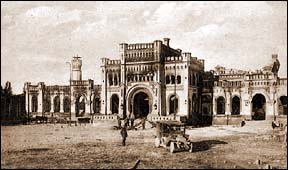What Happened to the Chinese in the Tsar’s Army?
Posted: February 20th, 2015 | No Comments »Reading Mark O’Neill’s recent book on the Chinese who worked on the Eastern Front in WW1. I wondered what happened to those men – many came home, others stayed in Russia and their fates are lesser known. Many presumably ended up in various Chinatowns in Russia such as those at Vladivostok (there are some incredible pictures of Millionka here by the way that I didn’t know about) and Murmansk I’ve written about recently. Others? who knows – one small anecdote from Truman Capote when he visited Russia in 1956 is perhaps instructive – a young man in 1914 of say, 20, would be in his early sixties in 1956 and similar to Capote’s Chinese encountered on Brest-Litovsk Railway Station. Brest-Litovsk is now simply Brest in Belarus.
Capote recounts his encounter in The Muses are Heard as he wanders through the few kiosks set up to supply victuals to the train passengers heading to St Petersburg (Leningrad)…
It was puzzling to discover that each of the kiosks sold the same products, cans of Red Star salmon, Red Star sardines, Kremlin perfume, dusty bottles of Kremlin candy, pickled tomatoes, hairy slabs of raw bacon slapped between thick slices of grime coloured bread, weird liqueurs, cross buns (without the cross) that one somehow felt had been baked last July. And though the kiosks were attracting a brisk trade, the most sought after item was not on sale at any of them. It was in the private hands of a peddler, an elderly Chinese who carried a tray of apples. The apples were as shriveled and miniature as himself, but his waiting line of customers appeared disconsolate when the last of them evaporated. At the far end of the area a flight of steps led to the main entrance of the station, and the Chinese, folding his empty tray, wandered over to them and sat down next to a friend. The friend was a beggar bundled in an old army coat and with a pair of crutches sprawled beside him like the wings of a wounded bird. Every third or fourth person going by dropped a coin into his hand. The Chinese gave him something too. An apple. He’d saved one ofr the beggar, and one for himself. The two friends gnawed their apples and leaned against each other in the cutting cold.Â
Brest Litovsk train station around the time of the First World War
Capote


Leave a Reply